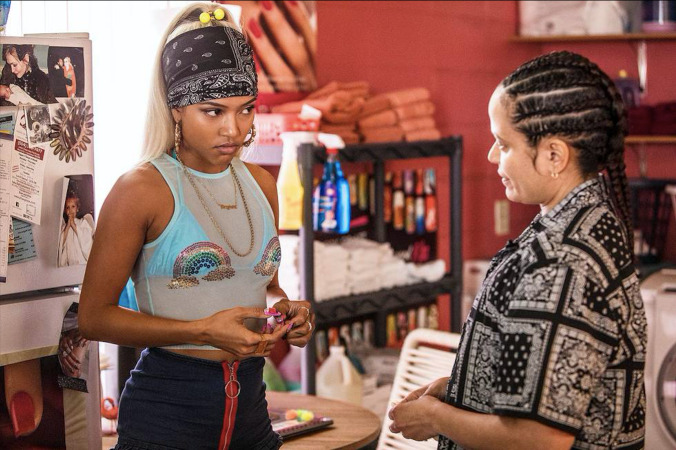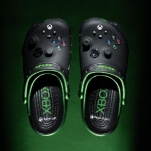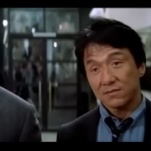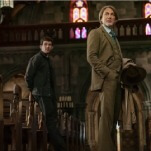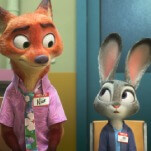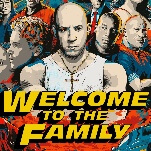With its vibrant color scheme, superficially wacky characters, and Florida setting, Claws appeared to be the perfect summer show when it premiered in June 2017. But as its first season unfolded, the TNT drama revealed itself to be more Venus flytrap than Southern blossom. The uniformly great performances—including standout turns from Niecy Nash and Carrie Preston—along with the nimble shifting of tone from melodrama to comedy made Claws highly addictive. Occasionally, it looked like creator Eliot Laurence and showrunner Janine Sherman Barrois would lose their grip on the baroque storytelling, but the season-one finale filed down the extra layers, and Desna (Nash) and her crew emerged as tight-knit as ever.
But even the notion of a summer show—something light and accessible, or maybe just not ready for the regular season—has changed over time. Series like Claws, GLOW, Stranger Things (though it was bumped up to Netflix’s fall lineup for season two), and Killing Eve have made viewers and critics recalibrate their expectations of these “outdoor month” offerings. Another notable shift in that changing landscape is the focus on women-led stories and series. In addition to new seasons of Claws, GLOW, and Unbreakable Kimmy Schmidt, the summer season has seen the premieres of Vida, Pose, and Dietland—all compelling series, and all centered on women. Elsewhere, comedian and White House Correspondents’ Dinner host Michelle Wolf debuted her talk show, The Break, last month, while an HBO docuseries highlighted the remarkable life of world-class athlete Serena Williams.
As varied as these series are, they all tap into the larger cultural discussion—and social reckoning—that’s spread along with the second wave of Tarana Burke’s #MeToo movement. Dietland and GLOW respectively tackle misogyny from the present and the not-so-distant past, while Vida and Pose have set out to establish refuge for the most vulnerable women, including queer trans women of color. In the season four-episode “Party Monster,” Unbreakable Kimmy Schmidt, which has always centered on a survivor of sexual assault, was more overt in nodding to alleged predators like Harvey Weinstein and Charlie Rose, who are already plotting their comebacks.
And from deep within Florida (or rather, New Orleans, where the show is mostly filmed), Claws has also set its sights on abusers at every level. Season one established the core ensemble: Desna, the goodhearted but morally pliable leader; her best friend and lieutenant, Jennifer (Jenn Lyon); the “enforcer,” Quiet Ann (Judy Reyes); grifter and parolee Polly (Carrie Preston); and upstart Virginia (Karrueche Tran), who’s proven herself to the whole crew, though she still spars with Desna. These women work in tandem in virtually all things, including revenge, even when, as with Virginia and Desna, they’ve first wronged each other. When season two begins, the Nail Artisans team has already weathered prison sentences, money laundering, heartbreak, kidnappings, attempted murder, and multiple drug-running schemes. The women are no longer under the thumb of the Dixie Mafia and its leader, Uncle Daddy (a funny and ferocious Dean Norris), but they’re now beholden to Riva (Andrea Sooch), a Russian underworld heavy.
Claws doesn’t pretend that this new hierarchy is any more equitable just because there’s a woman on top. Early on in the season-two premiere, which airs June 10, Desna’s boyfriend, Dr. Ruval (Jimmy Jean-Louis), tells her, “If you don’t like the ruling party, stage a coup.” When I asked the cast and executive producers if they’ve taken that statement to heart elsewhere in the show (and beyond), they all agreed. Laurence, who was originally inspired by outrageous “Florida Man” and “Florida Woman” headlines, wanted his show to feature “women taking control of their lives and being badass.” That dynamic has been a “lifelong source of joy” for the Big Gay Sketch Show alum, and even more so for Sherman Barrois, who’s applied her background in procedurals like Criminal Minds and ER to the other side of the line between law and order. And for Sherman Barrois, there’s a sense of obligation to “tell good stories that put women at the forefront, but also to make sure that the women seem real, because so often we’ve been sidekicks, or in the margins, even as love interests.” So the women of Claws are not just “prizes, or the thing that a man gets at the end of a long day… to actually have complicated women throughout the whole narrative is real, and it is bold, and it’s refreshing.”
Studies continue to show that there’s a disproportionately low number of well-rounded women characters on TV, which is why Claws’ five female leads and their distinct personalities are groundbreaking. But unlike the complex women who are kept apart in genre storytelling, Desna, Polly, Jennifer, Virginia, and Quiet Ann mostly act as a cohesive unit. They’re all flawed and as such are capable of betraying each other, but the women of Claws look after each other. Off screen, there’s a conspiratorial and convivial air, with Tran teasing Lyon about diet soda and Preston joking with Reyes about the show’s upcoming Magic Mike XXL homage. There’s the same sense of solidarity on screen: In season one, Roller (Jack Kesy) pit Desna and Virginia against each other, but when he physically assaulted one of them, they didn’t hesitate to team up against him. That’s exactly the dynamic that Sherman Barrois, Laurence, and the cast aim to capture and promote—not just the camaraderie, but the consequences. As Sherman Barrois tells me: “It’s time for women to stand up and say what they want. I mean, Desna—and Niecy as a leader and as an actress—they say what they want. They mean what they say. I do think there is a sort of Time’s Up element to women staying in the corner. As they come out politically, as we’re seeing in these movements, what you’re also seeing in narratives is that they’re finally being pushed to the forefront.”
“They are talking about toppling the patriarchy,” she says, referencing all the women who have spoken up about systemic abuse in Hollywood and other industries, as well as her characters and cast. When season two begins, it looks like the plucky nail techs will get their wish, at least: the Hussers—Uncle Daddy, Roller, and Bryce (Kevin Rankin)—have been demoted to errand boys. Desna now calls some of the shots, and has clearly taken to her new role. The first two episodes introduce us to this new order, but things quickly get out of hand, as they usually do on Claws. The premiere is a hilarious, flamboyant, and bracing hour, with a story that underscores female friendships and ends with a bang. It’s a perfect example of how stylish a show with a message can be—and the team behind Claws definitely has something to say about women’s rights, and misogyny in their industry and beyond.
Nash leads the ensemble with grace and fire, and is thrilled to give voice to “social issues around the world,” including centering stories on black women, women of color, queer women, trans women, plus-size women, and more: “If you’re a woman, come on. There’s room.” Tran, who’s the youngest in the cast, is proud of the show for addressing women’s reproductive rights in a way that’s rarely seen on TV, and she credits Time’s Up in part for helping to move the needle: “Reproductive rights go hand in hand with what that movement’s trying to achieve. This is a great year for women, and I’m so glad that Claws can be a part of that, and push that forward.”
Indeed, the episode in question slows things down to explore a woman’s right to choose, even bringing in characters we haven’t seen before to demonstrate just how distinct the experiences and perspectives are. Sherman Barrois, who wrote the episode, frames these stories in a respectful yet inventive manner—you will never feel preached to when watching Claws. Preston, who plays the clever and mercurial Polly, agrees: “We’re not dogmatic about anything. [Claws] is messy and weird, and funny and elevated, and dark all at the same time.” And, like her co-stars, she stresses the importance of telling these complex stories, and of “sisterhood and multiculturalism on screen.”
The people responsible for Claws are clearly on the same page, gathering in what they all note has been traditionally coded a feminine space: a nail salon. Laurence, an out gay man, says his fascination with nail culture led him to the setting, and it’s a passion reflected in the fact that the show sent its stars to nail school, and brought in prominent nail artist Morgan Dixon to consult. Laurence admits that he’s always been on the outside looking in, but he never wanted Claws to have stereotypical depictions of women obsessing over men: “We were determined to pass the Bechdel test with flying colors from the first moment.”
But they acknowledge that not everyone can see the allure of such a place. Lyon even says her boyfriend thinks “if I’m hanging out with more than four women, it’s a coven. And we’re casting spells, and doing things. But isn’t it interesting in this day and age, that if women get together, and are talking about a thing, it’s considered a threat?”
The writing smartly skewers any perceived threats or concerns about what goes on when women gather, by presenting the most extreme examples, e.g., money laundering, drug running, and covering up a murder (or two). But it also plays into the notions of conspiracy theorists who believe there are cabals of women, who are working in the shadows to bring down influential men. That’s patently untrue, but what is real is the responsibility that women feel toward each other, which is always on display among the main characters of Claws. Women look out for each other on this TNT drama because, as Reyes says, they always have: “I’m Dominican, and in the Dominican Republic, the whole revolution, the overthrowing of their dictator was launched by three sisters. So it’s kind of always been [up to] women.”
I ask Lyon about the ways women took care of and warned each other before there were hashtags, when they relied on meaningful looks and the whisper network. She fires back her own questions: “What if we don’t have to whisper? … What if we can holler, knock on doors? What if we can do exactly what we want to do? How will that upset what’s happening in the world, and then what happens to the world?” The answers to these questions are still being worked out in real life, but on Claws, the tide’s already turned.
